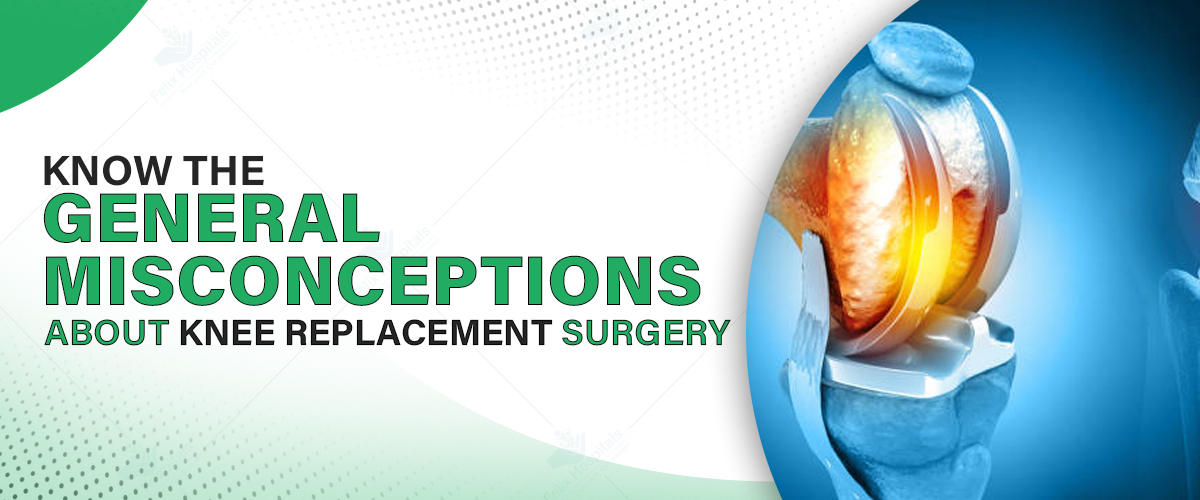
Subscribe to our

Knee replacement surgery or knee arthroplasty is a surgical operation that consists of replacing a damaged or diseased knee joint with a synthetic joint or a prosthesis. It is widely known to cure prolonged knee pain and enhance mobility. With its 95% success rate, it dramatically enhances patients' quality of life in the best orthopedic hospital in Noida. While these advantages are present, the majority get discouraged to have knee replacement surgery because of myths. Let the experts disprove them!
Book a one-on-one session and get a customized treatment plan that caters to you.
Below is a closer look at some of the myths and the facts that lie behind them:
Fact: In comparison to this, knee replacement is a highly successful operation. Studies and patient history have proven that a success rate of approximately 95% has been consistently achieved. Most patients feel great pain relief and improvement in function, enabling them to perform routine activities easily.
Fact: How much the knee will bend after surgery will depend on a number of factors, including the operation that has been performed, the quality of the prosthesis, and attendance at post-operative rehabilitation by the patient. Nearly all implants today will be capable of full movement, like the natural knee, as long as they are of high quality.
Fact: When complications arise or the implant fails with time, a repeat procedure known as revision surgery becomes necessary. Revision surgery corrects the issues of the initial procedure and restores function and comfort.
Fact: Advances in surgical technique and implant material have significantly extended the lifespan of a knee replacement. In the majority of cases, the prosthesis has a shelf life of 20 years or more, and in some instances, a lifetime—if patients follow the right guidelines for maintenance.
Fact: Post-op recovery times can be extremely variable based on individual health and compliance with post-op rehabilitation, but the risks are highest in the first few weeks and most individuals are able to get back to normal daily activities within 4 to 6 weeks. Mobilization and guided exercises based upon a predetermined calendar are critical for the rapid recovery of knee replacement surgery in Noida.
Fact: Replacing both knees at once during one operation—bilateral knee replacement—is an option and advantage for some patients. One hospital stay and rehabilitation at the same time is simpler and less expensive for appropriate recipients.
Fact: Most patients can drive after 6–8 weeks if they have recovered adequate strength and mobility in the operated limb. Always clear any return to driving with your surgeon.
Fact: There is no upper limit to getting a knee replacement. It is actual. The majority of patients having knee replacements are in their 60s, 70s, or even older. Age is irrelevant; what matters are your overall health and the degree of joint degeneration.
Fact: Biocompatible material is incorporated into the fashioning of knee implants that will operate securely in the body. The materials, like some metals and plastics, are inert and won't induce any adverse reaction or rejection.
Fact: Most patients manage well by adhering to their hospital surgical team's prescribed exercise routine. With discipline and effective guidance, most of the patients recover mobility and walk on their own within weeks.
Make an appointment today with orthopedic surgeons and take your first sure step toward a healthy, mobile life.
Knee replacement is a groundbreaking surgery that has restored millions of people's mobility and allowed them to lead pain-free lives. But myths deter people from getting treated at the appropriate time. With knowledge of facts and shattering the myths, you can make bolder, wiser decision-making choices for your well-being. Whether worried about age, rehabilitation, or long-term success, recall—knee replacement is safer, more successful, and more affordable than ever.
If you or a loved one are considering knee replacement, consult with a trusted orthopedic specialist. At Felix Hospital, one of the highest rated orthopedic hospitals, our experienced professionals deliver state-of-the-art surgical expertise, personalized rehabilitation plans, and compassionate care every step of the way. Don't let misconceptions keep you from a more active, pain-free lifestyle.
Begin healing today.
Q: Is knee replacement worth it if I'm getting by on painkillers?
Ans: If painkillers are becoming a way of life, then it might be time to go in for surgery. Knee replacement addresses the root of the problem, not the symptom, with lasting relief and reducing the necessity for medication.
Q: What is the optimum age for a knee replacement? Am I too young or too old?
Ans: There is no "ideal" age. If pain from chronic conditions interrupts daily activities, limits movement, or keeps you from enjoying what you love, your age isn't the problem—your quality of life is the problem.
Q: Will I be able to kneel, sit cross-legged, or do yoga after surgery?
Ans: Although time is required for high-flexion activities, most patients attain an adequate range of motion to floor or knee sit. It is recovery, implant, and physiotherapy dependent. We will support you in achieving your recovery goals.
Q: How do I prepare my home for recovery from knee surgery?
Ans: Small changes—such as installing grab bars, using a raised toilet seat, and being able to reach—can make safety and recovery simpler. Our staff gives a detailed checklist at pre-surgery counseling.
Q: Can I still have knee surgery if I have diabetes or high blood pressure?
Ans: Yes, those patients with well-controlled hypertension or diabetes can usually get along just as well without a problem. Our preoperative evaluation ensures you are healthy enough for surgery, lessening any risk.
Q: When is it time for surgery?
Ans: If a couple of steps of walking exhaust you, stairs hurt, or even lying down does not provide you relief from pain—get seen by an orthopedic surgeon. We'll determine if surgery is an option for you at this time.